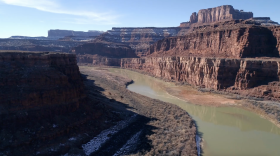
Great Salt Lake Collaborative
Great Salt Lake is at its lowest water level on record and continues to shrink. Utah Public Radio has teamed up with more than a dozen Utah organizations for the Great Salt Lake Collaborative, a group that has come together to share multimedia stories and rigorous reports about the lake and ways to protect this critical body of water before it's too late.
Learn more at greatsaltlakenews.org.
-
High temperatures and low snowfall has caused near record lows for the Great Salt Lake this year. Entering 2026, lake levels "paint a pretty dismal picture."
-
Brian Steed, the Great Salt Lake Commissioner, shared low Great Salt Lake levels on Nov. 20, 2025.
-
A coalition of environmental groups have asked a judge to keep a lawsuit over the future of the Great Salt Lake alive.
-
Utah's chief negotiator over the Colorado River explains that cuts to water supply may be coming to Utah.
-
As the Great Salt Lake continues to drop to near record-breaking levels, forced conservation measures are underway to address the drop's many impacts.
-
Years after an anonymous tip reporting the illegal dumping of chemical waste in Utah led to $27,519 fine, American Chemical closes its doors.
-
A new study finds the biggest factors behind Great Salt Lake shrinking is reduced stream flow from the Bear, Weber, and Jordan rivers, followed by evaporation from the lake surface.
-
The Great Salt Lake Strike Team released their 2024 report this week and the main conclusion is clear: long-term solutions are necessary to restore and rehabilitate
-
The waters of Great Salt Lake are rising to begin the new year, and experts hope that run will continue after recent storm activity within its basin.
-
Returning Rapid’s Mike Dehoff likens the river to a friend who is sick in the hospital ― and its symptoms are worsening











